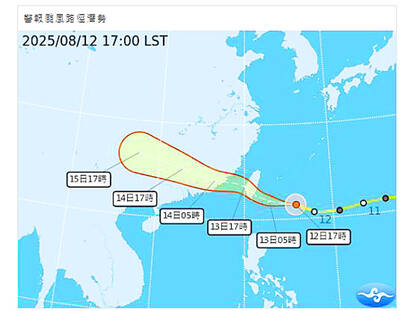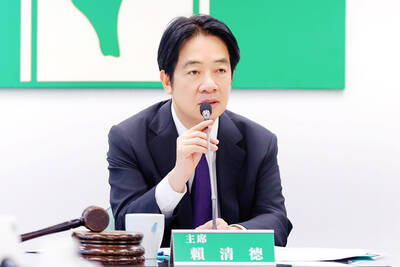The Taipei City Government yesterday introduced a new numbering system for the city's road names in a bid to help foreigners identify and remember street names more easily.
"What we're doing here is something meaningful and innovative," said Taipei City Mayor Ma Ying-jeou (
"We're not stupid. We're not changing all the street names. Instead we're giving nicknames to some major roads ? We hope the new system will help expatriates and especially foreign tourists find it easier to identify and remember the street names in Taipei."

Starting in late June, the city's 10 major east-west roads -- from Hoping Road to Mintsu Road -- will have a number and be known as a boulevard. For instance, Nanjing Road will be known as 7B.
The 14 major north-south roads -- from Huanho Road to Keelung Road -- will also have numbers and be known as avenues. For example Chungshan Road will be 6A under the new system.
Ma said the new system is not intended to trouble to city residents.
"They [city residents] don't have to worry about having to memorize the new names because they don't find Chinese road names confusing and hard to remember," he said.
The new system was first proposed by Stanley Yen (
"I often receive complaints in my office about the city's confusing road names. As Taipei sees a growing number of international visitors, we would like to create a traveler friendly and barrier free city for them," he said.
To help foreigners who don't speak or read Chinese to better get around in the city, Yen said, the association will team up with the city's transportation and civil affairs bureaus to publish a total of 100,000 plastic reference maps and distribute them to the city's 60,000 taxi drivers.
The reference maps contain a simplified city map with old and new street names on one side and major tourist attractions and landmarks printed in Chinese, English and Japanese on the other.
Kai Wiechmann, a traveling photographer from Germany, said the new initiative appears to be a good idea for a first-time and short-term visitor such as him.
"I think it might help foreign travelers a lot," he said. "I personally haven't had much trouble finding my way around since I was here last Thursday. The only difficulty I have is the language."
Matthew Tamney, a business owner who has been in Taiwan for about 11 years, also approved of the new system. "It's very much similar to that in New York City where I'm originally from. I hope it works just as well," he said. "The new system makes it easier to remember street names, most of which contain directions, making it confusing at first."
Vitas Raskevicius, a Canadian university teacher who has been living here for about three years, said the new system simply did not make sense.
"This is a practical issue. I don't see how any additional names can be of any use," he said. "A new system is bound to contribute to confusion, and there's too much trouble to learn all the new names." He also hit out at the current confusing spelling system.
"The city should be embarrassed about the spelling," he said. "It's ridiculous to have such inconsistency in the English transcription of the street names. What they should have done is to keep the names and just spell them consistently."

GET TO SAFETY: Authorities were scrambling to evacuate nearly 700 people in Hualien County to prepare for overflow from a natural dam formed by a previous typhoon Typhoon Podul yesterday intensified and accelerated as it neared Taiwan, with the impact expected to be felt overnight, the Central Weather Administration (CWA) said, while the Directorate-General of Personnel Administration announced that schools and government offices in most areas of southern and eastern Taiwan would be closed today. The affected regions are Tainan, Kaohsiung and Chiayi City, and Yunlin, Chiayi, Pingtung, Hualien and Taitung counties, as well as the outlying Penghu County. As of 10pm last night, the storm was about 370km east-southeast of Taitung County, moving west-northwest at 27kph, CWA data showed. With a radius of 120km, Podul is carrying maximum sustained

Tropical Storm Podul strengthened into a typhoon at 8pm yesterday, the Central Weather Administration (CWA) said, with a sea warning to be issued late last night or early this morning. As of 8pm, the typhoon was 1,020km east of Oluanpi (鵝鑾鼻), Taiwan’s southernmost tip, moving west at 23kph. The storm carried maximum sustained winds of 119kph and gusts reaching 155kph, the CWA said. Based on the tropical storm’s trajectory, a land warning could be issued any time from midday today, it added. CWA forecaster Chang Chun-yao (張竣堯) said Podul is a fast-moving storm that is forecast to bring its heaviest rainfall and strongest

President William Lai (賴清德) yesterday criticized the nuclear energy referendum scheduled for Saturday next week, saying that holding the plebiscite before the government can conduct safety evaluations is a denial of the public’s right to make informed decisions. Lai, who is also the chairman of the Democratic Progressive Party (DPP), made the comments at the party’s Central Standing Committee meeting at its headquarters in Taipei. ‘NO’ “I will go to the ballot box on Saturday next week to cast a ‘no’ vote, as we all should do,” he said as he called on the public to reject the proposition to reactivate the decommissioned

TALKS CONTINUE: Although an agreement has not been reached with Washington, lowering the tariff from 32 percent to 20 percent is still progress, the vice premier said Taiwan would strive for a better US tariff rate in negotiations, with the goal being not just lowering the current 20-percent tariff rate, but also securing an exemption from tariff stacking, Vice Premier Cheng Li-chiun (鄭麗君) said yesterday. Cheng made the remarks at a news conference at the Executive Yuan explaining the new US tariffs and the government’s plans for supporting affected industries. US President Donald Trump on July 31 announced a new tariff rate of 20 percent on Taiwan’s exports to the US starting on Thursday last week, and the Office of Trade Negotiations on Friday confirmed that it